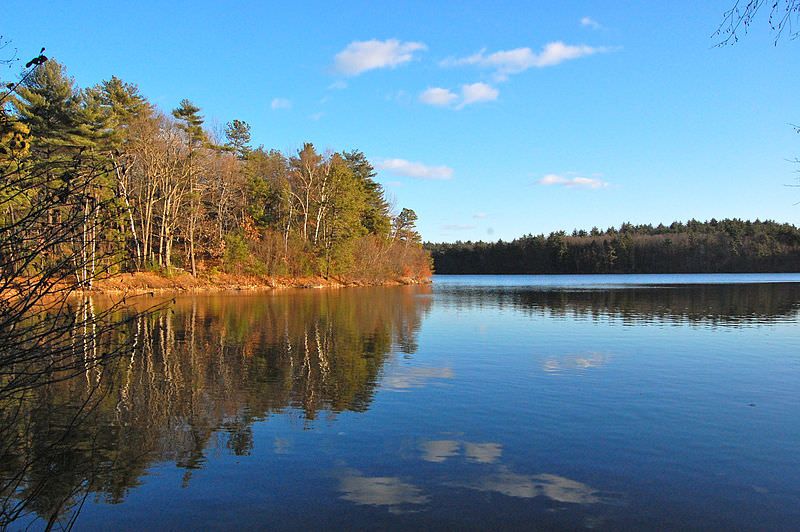Walden Pond’s Ecosystem Change – Case Study
Published on by Water Network Research, Official research team of The Water Network in Academic
Climate change and recreation at Walden Pond may have drastically altered its ecosystem.

Walden Pond, Source: Wikimedia Commons, Labeled for Reuse
Famously known as the setting for Henry David Thoreau’s “Walden”, Walden Pond in Massachusetts has been a popular destination for swimmers and tourists since the early 20th century. Previous research has shown that this popularity has taken its toll on the water’s clarity and the overall lake ecosystem.
To better understand the long-term effects of human activity on chemical and biological conditions in Walden Pond, J. Curt Stager and colleagues from Paul Smith’s College, U.S., studied six sediment cores from the bottom of the lake. They examined the remains of glassy-shelled algae preserved in the cores, since these algae require sunlight and can therefore indicate water depth and clarity. The researchers also used radioisotopic dating to determine how old the cores were, and to document how the growth of algae in the lake has shifted over time.
The analysis showed that levels of microscopic algae known as phytoplankton have increased in Walden Pond since the 1920s, following recreational development of the shoreline. The researchers suggest that sediments running off from disturbed shorelines and a footpath to the Thoreau cabin, along with human waste associated with swimmers, may have contributed to shifts in algal nutrient levels in the lake, allowing certain kinds of phytoplankton to thrive and reduce the clarity of the water.
Future climate change may exacerbate such problems at Walden Pond because warmer, wetter conditions can also favor species of phytoplankton that could further cloud the waters. The researchers therefore suggest that lake managers develop plans to further reduce the flow of human-derived nutrients to the lake under the warmer, wetter conditions that most climate models project for New England during the 21st century.
“The sediments of Walden Pond record major ecological changes to this iconic lake since the time of Thoreau,” Stager says. “They also warn of more changes to come in a warming future.”
#####
Reference: Stager JC, Wiltse B, Hubeny JB, Yankowsky E, Nardelli D, Primack R (2018) Climate variability and cultural eutrophication at Walden Pond (Massachusetts, USA) during the last 1800 years. PLoS ONE 13(4): e0191755. https://doi.org/10.1371/journal.pone.0191755
Source: PLOS
Media
Taxonomy
- Resource Management
- Environment
- Climate Change
- Sustainable Water Resource Management
- Lake Management
- Climate Change Adaptation
- Climate Change Resilience
- Water Resource Management